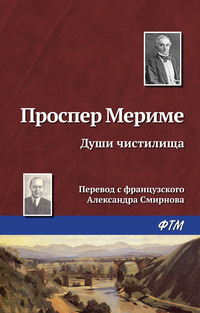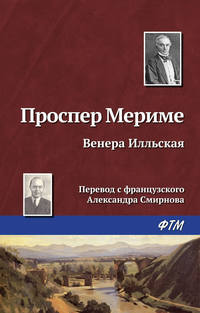 полная версия
полная версияColomba
“. . . He will see two holes in it . . . For each hole a hole in another shirt! . . . But will that accomplish the vengeance? . . . I must have the hand that fired, the eye that aimed . . . the heart that planned!” . . .
Suddenly the sailor stopped short.
“Why don’t you go on, my good man?” inquired Miss Nevil.
The sailor, with a jerk of his head, pointed to a figure appearing through the main hatchway of the schooner: it was Orso, coming up to enjoy the moonlight. “Pray finish your song,” said Miss Lydia. “It interests me greatly!”
The sailor leaned toward her, and said, in a very low tone, “I don’t give the rimbecco to anybody!”
“The what?”
The sailor, without replying, began to whistle.
“I have caught you admiring our Mediterranean, Miss Nevil,” said Orso, coming toward her. “You must allow you never see a moon like this anywhere else!”
“I was not looking at it, I was altogether occupied in studying Corsican. That sailor, who has been singing a most tragic dirge, stopped short at the most interesting point.”
The sailor bent down, as if to see the compass more clearly, and tugged sharply at Miss Nevil’s fur cloak. It was quite evident his lament could not be sung before Lieutenant Orso.
“What were you singing, Paolo France?” said Orso. “Was it a ballata or a vocero? Mademoiselle understands you, and would like to hear the end.”
“I have forgotten it, Ors’ Anton’,” said the sailor.
And instantly he began a hymn to the Virgin, at the top of his voice.
Miss Lydia listened absent-mindedly to the hymn, and did not press the singer any further—though she was quite resolved, in her own mind, to find out the meaning of the riddle later. But her maid, who, being a Florentine, could not understand the Corsican dialect any better than her mistress, was as eager as Miss Lydia for information, and, turning to Orso, before the English lady could warn her by a nudge, she said: “Captain what does giving the rimbecco mean?”
“The rimbecco!” said Orso. “Why, it’s the most deadly insult that can be offered to a Corsican. It means reproaching him with not having avenged his wrong. Who mentioned the rimbecco to you?”
“Yesterday, at Marseilles,” replied Miss Lydia hurriedly, “the captain of the schooner used the word.”
“And whom was he talking about?” inquired Orso eagerly.
“Oh, he was telling us some odd story about the time—yes, I think it was about Vannina d’Ornano.”
“I suppose, mademoiselle, that Vannina’s death has not inspired you with any great love for our national hero, the brave Sampiero?”
“But do you think his conduct was so very heroic?”
“The excuse for his crime lies in the savage customs of the period. And then Sampiero was waging deadly war against the Genoese. What confidence could his fellow-countrymen have felt in him if he had not punished his wife, who tried to treat with Genoa?”
“Vannina,” said the sailor, “had started off without her husband’s leave. Sampiero did quite right to wring her neck!”
“But,” said Miss Lydia, “it was to save her husband, it was out of love for him, that she was going to ask his pardon from the Genoese.”
“To ask his pardon was to degrade him!” exclaimed Orso.
“And then to kill her himself!” said Miss Lydia. “What a monster he must have been!”
“You know she begged as a favour that she might die by his hand. What about Othello, mademoiselle, do you look on him, too, as a monster?”
“There is a difference; he was jealous. Sampiero was only vain!”
“And after all is not jealousy a kind of vanity? It is the vanity of love; will you not excuse it on account of its motive?”
Miss Lydia looked at him with an air of great dignity, and turning to the sailor, inquired when the schooner would reach port.
“The day after to-morrow,” said he, “if the wind holds.”
“I wish Ajaccio were in sight already, for I am sick of this ship.” She rose, took her maid’s arm, and walked a few paces on the deck. Orso stood motionless beside the helm, not knowing whether he had better walk beside her, or end a conversation which seemed displeasing to her.
“Blood of the Madonna, what a handsome girl!” said the sailor. “If every flea in my bed were like her, I shouldn’t complain of their biting me!”
Miss Lydia may possibly have overheard this artless praise of her beauty and been startled by it; for she went below almost immediately. Shortly after Orso also retired. As soon as he had left the deck the maid reappeared, and, having cross-questioned the sailor, carried back the following information to her mistress. The ballata which had been broken off on Orso’s appearance had been composed on the occasion of the death of his father, Colonel della Rebbia, who had been murdered two years previously. The sailor had no doubt at all that Orso was coming back to Corsica per fare la vendetta, such was his expression, and he affirmed that before long there would be fresh meat to be seen in the village of Pietranera. This national expression, being interpreted, meant that Signor Orso proposed to murder two or three individuals suspected of having assassinated his father—individuals who had, indeed, been prosecuted on that account, but had come out of the trial as white as snow, for they were hand and glove with the judges, lawyers, prefect, and gendarmes.
“There is no justice in Corsica,” added the sailor, “and I put much more faith in a good gun than in a judge of the Royal Court. If a man has an enemy he must choose one of the three S’s.” (A national expression meaning schioppetto, stiletto, strada—that is, gun, dagger, or flight.)
These interesting pieces of information wrought a notable change in Miss Lydia’s manner and feeling with regard to Lieutenant della Rebbia. From that moment he became a person of importance in the romantic Englishwoman’s eyes.
His careless air, his frank and good humour, which had at first impressed her so unfavourably, now seemed to her an additional merit, as being proofs of the deep dissimulation of a strong nature, which will not allow any inner feeling to appear upon the surface. Orso seemed to her a sort of Fieschi, who hid mighty designs under an appearance of frivolity, and, though it is less noble to kill a few rascals than to free one’s country, still a fine deed of vengeance is a fine thing, and besides, women are rather glad to find their hero is not a politician. Then Miss Nevil remarked for the first time that the young lieutenant had large eyes, white teeth, an elegant figure, that he was well-educated, and possessed the habits of good society. During the following day she talked to him frequently, and found his conversation interesting. He was asked many questions about his own country, and described it well. Corsica, which he had left when young, to go first to college, and then to the Ecole militaire, had remained in his imagination surrounded with poetic associations. When he talked of its mountains, its forests, and the quaint customs of its inhabitants he grew eager and animated. As may be imagined, the word vengeance occurred more than once in the stories he told—for it is impossible to speak of the Corsicans without either attacking or justifying their proverbial passion. Orso somewhat surprised Miss Nevil by his general condemnation of the undying hatreds nursed by his fellow-countrymen. As regarded the peasants, however, he endeavoured to excuse them, and claimed that the vendetta is the poor man’s duel. “So true is this,” he said, “that no assassination takes place till a formal challenge has been delivered. ‘Be on your guard yourself, I am on mine!’ are the sacramental words exchanged, from time immemorial, between two enemies, before they begin to lie in wait for each other. There are more assassinations among us,” he added, “than anywhere else. But you will never discover an ignoble cause for any of these crimes. We have many murderers, it is true, but not a single thief.”
When he spoke about vengeance and murder Miss Lydia looked at him closely, but she could not detect the slightest trace of emotion on his features. As she had made up her mind, however, that he possessed sufficient strength of mind to be able to hide his thoughts from every eye (her own, of course, excepted), she continued in her firm belief that Colonel della Rebbia’s shade would not have to wait long for the atonement it claimed.
The schooner was already within sight of Corsica. The captain pointed out the principal features of the coast, and, though all of these were absolutely unknown to Miss Lydia, she found a certain pleasure in hearing their names; nothing is more tiresome than an anonymous landscape. From time to time the colonel’s telescope revealed to her the form of some islander clad in brown cloth, armed with a long gun, bestriding a small horse, and galloping down steep slopes. In each of these Miss Lydia believed she beheld either a brigand or a son going forth to avenge his father’s death. But Orso always declared it was some peaceful denizen of a neighbouring village travelling on business, and that he carried a gun less from necessity than because it was the fashion, just as no dandy ever takes a walk without an elegant cane. Though a gun is a less noble and poetic weapon than a stiletto, Miss Lydia thought it much more stylish for a man than any cane, and she remembered that all Lord Byron’s heroes died by a bullet, and not by the classic poniard.
After three days’ sailing, the ship reached Les Sanguinaires (The Bloody Islands), and the magnificent panorama of the Gulf of Ajaccio was unrolled before our travellers’ eyes. It is compared, with justice, to the Bay of Naples, and just as the schooner was entering the harbour a burning maquis, which covered the Punta di Girato, brought back memories of Vesuvius and heightened the resemblance. To make it quite complete, Naples should be seen after one of Attila’s armies had devastated its suburbs—for round Ajaccio everything looks dead and deserted. Instead of the handsome buildings observable on every side from Castellamare to Cape Misena, nothing is to be seen in the neighbourhood of the Gulf of Ajaccio but gloomy maquis with bare mountains rising behind them. Not a villa, not a dwelling of any kind—only here and there, on the heights about the town, a few isolated white structures stand out against a background of green. These are mortuary chapels or family tombs. Everything in this landscape is gravely and sadly beautiful.
The appearance of the town, at that period especially, deepened the impression caused by the loneliness of its surroundings. There was no stir in the streets, where only a few listless idlers—always the same—were to be seen; no women at all, except an odd peasant come in to sell her produce; no loud talk, laughter, and singing, as in the Italian towns. Sometimes, under the shade of a tree on the public promenade, a dozen armed peasants will play at cards or watch each other play; they never shout or wrangle; if they get hot over the game, pistol shots ring out, and this always before the utterance of any threat. The Corsican is grave and silent by nature. In the evening, a few persons come out to enjoy the cool air, but the promenaders on the Corso are nearly all of them foreigners; the islanders stay in front of their own doors; each one seems on the watch, like a falcon over its nest.
CHAPTER IV
When Miss Lydia had visited the house in which Napoleon was born, and had procured, by means more or less moral, a fragment of the wall-paper belonging to it, she, within two days of her landing in Corsica, began to feel that profound melancholy which must overcome every foreigner in a country whose unsociable inhabitants appear to condemn him or her to a condition of utter isolation. She was already regretting her headstrong caprice; but to go back at once would have been to risk her reputation as an intrepid traveller, so she made up her mind to be patient, and kill time as best she could. With this noble resolution, she brought out her crayons and colours, sketched views of the gulf, and did the portrait of a sunburnt peasant, who sold melons, like any market-gardener on the Continent, but who wore a long white beard, and looked the fiercest rascal that had ever been seen. As all that was not enough to amuse her, she determined to turn the head of the descendant of the corporals, and this was no difficult matter, since, far from being in a hurry to get back to his village, Orso seemed very happy at Ajaccio, although he knew nobody there. Furthermore, Miss Lydia had a lofty purpose in her mind; it was nothing less than to civilize this mountain bear, and induce him to relinquish the sinister design which had recalled him to his island. Since she had taken the trouble to study the young man, she had told herself it would be a pity to let him rush upon his ruin, and that it would be a glorious thing to convert a Corsican.
Our travellers spent the day in the following manner: Every morning the colonel and Orso went out shooting. Miss Lydia sketched or wrote letters to her friends, chiefly for the sake of dating them from Ajaccio. Toward six o’clock the gentlemen came in, laden with game. Then followed dinner. Miss Lydia sang, the colonel went to sleep, and the young people sat talking till very late.
Some formality or other, connected with his passports, had made it necessary for Colonel Nevil to call on the prefect. This gentleman, who, like most of his colleagues, found his life very dull, had been delighted to hear of the arrival of an Englishman who was rich, a man of the world, and the father of a pretty daughter. He had, therefore, given him the most friendly reception, and overwhelmed him with offers of service; further, within a very few days, he came to return his visit. The colonel, who had just dined, was comfortably stretched out upon his sofa, and very nearly asleep. His daughter was singing at a broken-down piano; Orso was turning over the leaves of her music, and gazing at the fair singer’s shoulders and golden hair. The prefect was announced, the piano stopped, the colonel got up, rubbed his eyes, and introduced the prefect to his daughter.
“I do not introduce M. della Rebbia to you,” said he, “for no doubt you know him already.”
“Is this gentleman Colonel della Rebbia’s son?” said the prefect, looking a trifle embarrassed.
“Yes, monsieur,” replied Orso.
“I had the honour of knowing your father.”
The ordinary commonplaces of conversation were soon exhausted. The colonel, in spite of himself, yawned pretty frequently. Orso, as a liberal, did not care to converse with a satellite of the Government. The burden of the conversation fell on Miss Lydia. The prefect, on his side, did not let it drop, and it was clear that he found the greatest pleasure in talking of Paris, and of the great world, to a woman who was acquainted with all the foremost people in European society. As he talked, he now and then glanced at Orso, with an expression of singular curiosity.
“Was it on the Continent that you made M. della Rebbia’s acquaintance?” he inquired.
Somewhat embarrassed, Miss Lydia replied that she had made his acquaintance on the ship which had carried them to Corsica.
“He is a very gentlemanly young fellow,” said the prefect, in an undertone; “and has he told you,” he added, dropping his voice still lower, “why he has returned to Corsica?”
Miss Lydia put on her most majestic air and answered:
“I have not asked him,” she said. “You may do so.”
The prefect kept silence, but, an instant later, hearing Orso speak a few words of English to the colonel, he said:
“You seem to have travelled a great deal, monsieur. You must have forgotten Corsica and Corsican habits.”
“It is quite true that I was very young when I went away.”
“You still belong to the army?”
“I am on half-pay, monsieur.”
“You have been too long in the French army not to have become a thorough Frenchman, I have no doubt?”
The last words of the sentence were spoken with marked emphasis.
The Corsicans are not particularly flattered at being reminded that they belong to the “Great Nations.” They claim to be a people apart, and so well do they justify their claim that it may very well be granted them.
Somewhat nettled, Orso replied: “Do you think, M. le Prefet, that a Corsican must necessarily serve in the French army to become an honourable man?”
“No, indeed,” said the prefect, “that is not my idea at all; I am only speaking of certain customs belonging to this country, some of which are not such as a Government official would like to see.”
He emphasized the word customs, and put on as grave an expression as his features could assume. Soon after he got up and took his leave, bearing with him Miss Lydia’s promise that she would go and call on his wife at the prefecture.
When he had departed: “I had to come to Corsica,” said Miss Lydia, “to find out what a prefect is like. This one strikes me as rather amiable.”
“For my part,” said Orso, “I can’t say as much. He strikes me as a very queer individual, with his airs of emphasis and mystery.”
The colonel was extremely drowsy. Miss Lydia cast a glance in his direction, and, lowering her voice:
“And I,” she said, “do not think him so mysterious as you pretend; for I believe I understood him!”
“Then you are clear-sighted indeed, Miss Nevil. If you have seen any wit in what he has just said you must certainly have put it there yourself.”
“It is the Marquis de Mascarille, I think, who says that, M. della Rebbia. But would you like me to give you a proof of my clear-sightedness? I am something of a witch, and I can read the thoughts of people I have seen only twice.”
“Good heavens! you alarm me. If you really can read my thoughts I don’t know whether I should be glad or sorry.”
“M. della Rebbia,” went on Miss Lydia, with a blush, “we have only known each other for a few days. But at sea, and in savage countries (you will excuse me, I hope)—in savage countries friendships grow more quickly than they do in society . . . so you must not be astonished if I speak to you, as a friend, upon private matters, with which, perhaps, a stranger ought not to interfere.”
“Ah, do not say that word, Miss Nevil. I like the other far better.”
“Well, then, monsieur, I must tell you that without having tried to find out your secrets, I have learned some of them, and they grieve me. I have heard, monsieur, of the misfortune which has overtaken your family. A great deal has been said to me about the vindictive nature of your fellow-countrymen, and the fashion in which they take their vengeance. Was it not to that the prefect was alluding?”
“Miss Lydia! Can you believe it!” and Orso turned deadly pale.
“No, M. della Rebbia,” she said, interrupting him, “I know you to be a most honourable gentleman. You have told me yourself that it was only the common people in your country who still practised the vendetta—which you are pleased to describe as a kind of duel.”
“Do you, then, believe me capable of ever becoming a murderer?”
“Since I have mentioned the subject at all, Monsieur Orso, you must clearly see that I do not suspect you, and if I have spoken to you at all,” she added, dropping her eyes, “it is because I have realized that surrounded, it may be, by barbarous prejudices on your return home, you will be glad to know that there is somebody who esteems you for having the courage to resist them. Come!” said she, rising to her feet, “don’t let us talk again of such horrid things, they make my head ache, and besides it’s very late. You are not angry with me, are you? Let us say good-night in the English fashion,” and she held out her hand.
Orso pressed it, looking grave and deeply moved.
“Mademoiselle,” he said, “do you know that there are moments when the instincts of my country wake up within me. Sometimes, when I think of my poor father, horrible thoughts assail me. Thanks to you, I am rid of them forever. Thank you! thank you!”
He would have continued, but Miss Lydia dropped a teaspoon, and the noise woke up the colonel.
“Della Rebbia, we’ll start at five o’clock to-morrow morning. Be punctual!”
“Yes, colonel.”
CHAPTER V
The next day, a short time before the sportsmen came back, Miss Nevil, returning with her maid from a walk along the seashore, was just about to enter the inn, when she noticed a young woman, dressed in black, riding into the town on a small but strong horse. She was followed by a sort of peasant, also on horseback, who wore a brown cloth jacket cut at the elbows. A gourd was slung over his shoulder and a pistol was hanging at his belt, his hand grasped a gun, the butt of which rested in a leathern pocket fastened to his saddle-bow—in short, he wore the complete costume of a brigand in a melodrama, or of the middle-class Corsican on his travels. Miss Nevil’s attention was first attracted by the woman’s remarkable beauty. She seemed about twenty years of age; she was tall and pale, with dark blue eyes, red lips, and teeth like enamel. In her expression pride, anxiety, and sadness were all legible. On her head she wore a black silk veil called a mezzaro, which the Genoese introduced into Corsica, and which is so becoming to women. Long braids of chestnut hair formed a sort of turban round her head. Her dress was neat, but simple in the extreme.
Miss Nevil had plenty of time to observe her, for the lady in the mezzaro had halted in the street, and was questioning somebody on a subject which, to judge from the expression of her eyes, must have interested her exceedingly. Then, as soon as she received an answer, she touched her mount with her riding-switch, and, breaking into a quick trot, never halted till she reached the door of the hotel in which Sir Thomas Nevil and Orso were staying. There, after exchanging a few words with the host, the girl sprang nimbly from her saddle and seated herself on a stone bench beside the entrance door, while her groom led the horses away to the stable. Miss Lydia, in her Paris gown, passed close beside the stranger, who did not raise her eyes. A quarter of an hour later she opened her window, and saw the lady in the mezzaro still sitting in the same place and in the same attitude. Not long afterward the colonel and Orso returned from hunting. Then the landlord said a few words to the young lady in mourning, and pointed to della Rebbia with his finger. She coloured deeply, rose eagerly, went a few paces forward, and then stopped short, apparently much confused. Orso was quite close to her, and was looking at her curiously.
“Are you Orso Antonio della Rebbia?” said she in a tremulous voice. “I am Colomba.”
“Colomba!” cried Orso.
And taking her in his arms he kissed her tenderly, somewhat to the surprise of the colonel and his daughter—but in England people do not kiss each other in the street.
“Brother,” said Colomba, “you must forgive me for having come without your permission. But I heard from our friends that you had arrived, and it is such a great consolation to me to see you.”
Again Orso kissed her. Then, turning to the colonel:
“This is my sister,” said he, “whom I never should have recognised if she had not told me her name—Colomba—Colonel Sir Thomas Nevil—colonel, you will kindly excuse me, but I can not have the honour of dining with you to-day. My sister—”
“But, my dear fellow, where the devil do you expect to dine? You know very well there is only one dinner in this infernal tavern, and we have bespoken it. It will afford my daughter great pleasure if this young lady will join us.”
Colomba looked at her brother, who did not need much pressing, and they all passed together into the largest room in the inn, which the colonel used as his sitting and dining room. Mademoiselle della Rebbia, on being introduced to Miss Nevil, made her a deep courtesy, but she did not utter a single word. It was easy to see that she was very much frightened at finding herself, perhaps for the first time in her life, in the company of strangers belonging to the great world. Yet there was nothing provincial in her manners. The novelty of her position excused her awkwardness. Miss Nevil took a liking to her at once, and, as there was no room disengaged in the hotel, the whole of which was occupied by the colonel and his attendants, she offered, either out of condescension or curiosity, to have a bed prepared in her own room for Mademoiselle della Rebbia.











